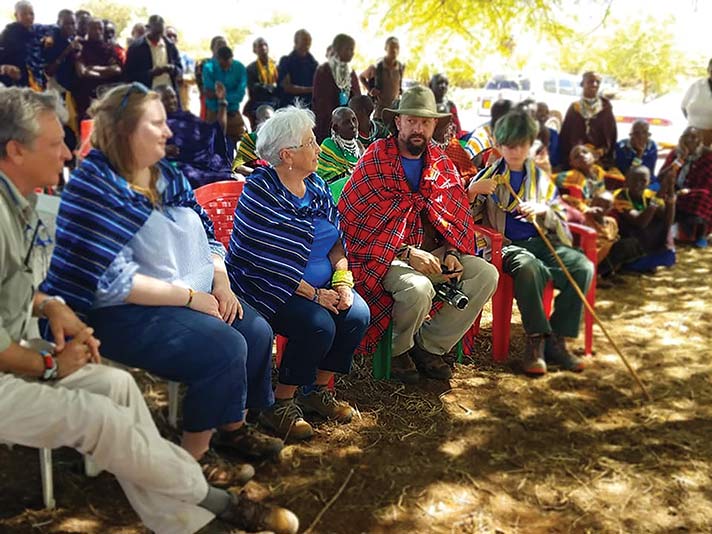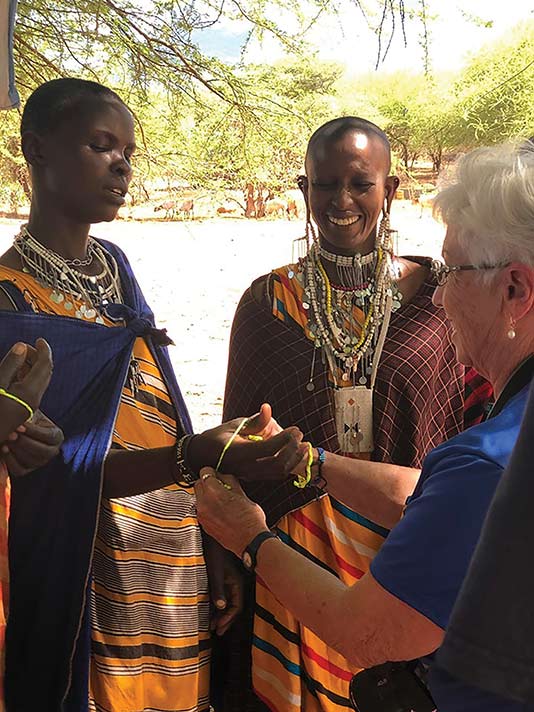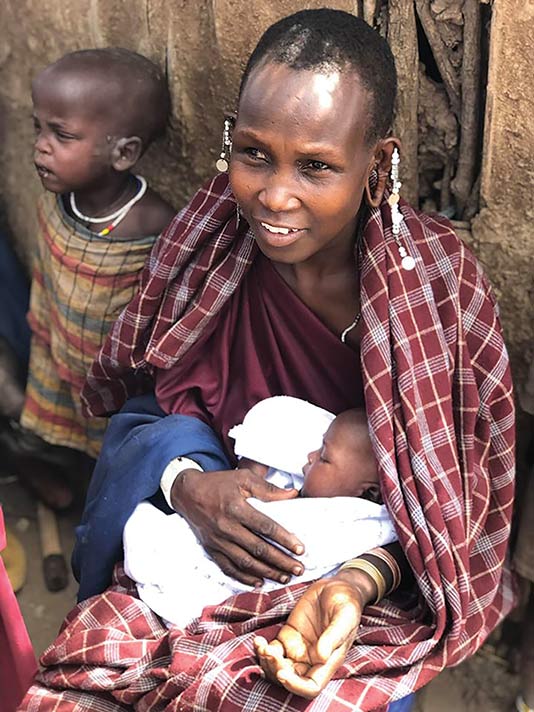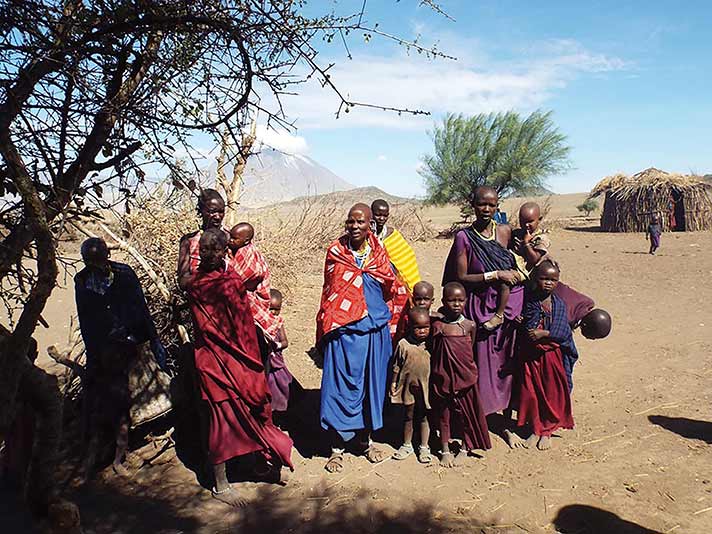In April 2019, Jacksonville’s Mary Van Horn traveled with members of her Rotary club to Tanzania, Africa. Below, please read a touching piece written by Mary upon her return after reflecting on the experience. Mary notes that the piece is based upon the knowledge and experience gained during the trip, and augmented with information from club member Platon Mantheakis (of the Jacksonville Inn,) and his brother, Michel Mantheakis who resides in Tanzania, Africa.
Mary traveled with Platon and was accompanied by fellow Rotarians Delando and Zorina Pagan (Rellik Winery) and their son Lucius, and Mary’s granddaughter, Emily Watts, of McCleary, Washington. Mary says, “The Tanzania we were shown by Michel and Platon Mantheakis is the Africa that tourists seldom see.”

The main purpose of the trip was to visit a drinking water well installed in Longido that was sponsored by the Jacksonville-Applegate Rotary Club. “Although I have seen many pictures of the holding tanks this well feeds into, the impact of the life-altering benefits of this well for the people of this community cannot be imagined and I was overwhelmed with gratitude that we had been a part of it,” Mary notes. She says she saw Masai women and children filling their barrels and containers, knowing that some had many miles to travel to get this water to their bomas (homes). Mary recalls, “I saw a small boy with a stick and crossbar with bottle caps that was his toy “car.” I watched Masai women set up their beaded bracelets in an impromptu market for us. I was called “BiBi” (grandmother) wherever we went and was considered an elder by the Masai.”
The visit to the well site was such an important event that a community ceremony was held and many local dignitaries attended including District Commissioner Mwaisumbe, considered one of the most important officials in the area and an advocate for Rotary water projects. “We learned that there are other projects that our Rotary Club can be a part of that will alter and improve lives immeasurably, such as running a water line from this well to a nearby village, building a bathroom at an elementary school and bringing water to that school which will also provide water to the surrounding community, assisting with the installation of pumps in two existing wells that are not currently functional due to a lack of pumps.”

Mary credits the success of the trip to the knowledge and assistance from Michel Manthaekis, who is an invaluable resource. He not only helped with travel logistics but also the difficult and time consuming political steps that must be accomplished for any project to succeed. The travel group was most grateful for Platon Mantheakis, who coordinated many details and provided an experience of a lifetime. “Platon has been planning and conducting trips to Tanzania for over 20 years with small but diverse groups like ours who have never been to Africa before…and this was a genuine “Out of Africa” experience,” Mary says. In the future, more trips to even remoter parts of Tanzania for the cause of clean water are being planned.
The Jacksonville-Applegate Rotary Club has held a Salmon Bake in September for ten years, with proceeds used to fund clean water projects not only in Tanzania, but also in Mexico and Guatemala. Mark your calendars for the 2019 Salmon Bake on September 15th.
I was born in Tanzania, Africa in a cow dung and straw plastered small circular hut built by Masai women. All of my family’s possessions will be within these walls. My hut is in a boma that is an enclosed circle of similar huts and is surrounded by Acacia tree branches that have big thorns to keep predators out at night. The cattle or sheep are gathered up and put in another enclosed area in the center of the boma that has another thorn barrier. The elevation of this livestock enclosure is 1-2 feet higher than where the huts are because of the accumulation of manure that has built up over the months and years.

My birth mother was attended by other Masai women in squalid conditions with no fresh water, or sanitation. It is very dark in the hut; there is no light at all so that the flies will stay out. The cooking circle in the middle is not vented, so we will all likely have severe lung damage by middle age. I have brothers and sisters, but since the mortality rate for children is 50% we won’t all live to adulthood. When I am quite young I may have a circle branded on each of my cheeks. This is to fool the flies to go to that circle rather than my eyes. When I am older and can go to the bathroom by myself, I will squat in bushes or the area around the boma. My younger brothers will be sent out at a very young age with a herd of cattle or goats for the entire day without water. When they are thirsty enough, they will have to find a dry stream bed and dig down approximately 2 feet to find water. They will guide the livestock home at dusk, and will finally have food and rest, only to do the same the next day. Because the plains are completely overgrazed, they will walk for miles and miles each day trying to find a few blades of grass for the livestock to eat. As a girl I will learn cooking and milking from my mother. Perhaps I will be the lucky one of my brothers and sisters to be selected to go to school. It is required by the state, but only one or two of us are permitted to go because we are needed to tend animals and do chores at the boma.
If the rains do not come during our rainy season, the consequences will be far reaching. Many of our livestock will die as the grass will not grow and there will be no water for them to drink. Because of the overgrazing by many animals, there are few seeds to replenish the savanna when rain comes. Many wild animals will die as there is no water for them to drink. Many of our people will die in a severe drought, especially the young and elderly.
One of my chores from a very early age is to walk, sometimes for many miles, with containers to fill up with water that I will either roll back with my feet or carry in a container on my back which is strapped to my forehead. This may be a several hour job or an all day job depending on the distance to the water source. My people will not consider any lifestyle other than a nomadic one and the herding of livestock. It is outside of our cultural norms to grow any vegetables or produce, so it must be purchased at a market. Our daily diet is a maize meal and raw cattle blood mixed with raw milk. A vein in the neck of a cow will be nicked to flow into a container and mixed with the milk. We alternate the cattle so we do not take too much blood from one. My bones are very healthy and I have never had any tooth problems or cavities. The women of my boma make many beaded items to sell at the market or to set up in the dirt to sell to any likely buyer who may come to our area. It is a last resort to sell or trade livestock because our wealth is based solely on the number of livestock we own.
We may learn of other ways and even embrace other religions, but if any other belief conflicts with our cultural beliefs, our cultural beliefs will always take precedent. When I am around 12 or 13 I will begin having sexual relations with boys or warriors and this will be expected of me. When I come into womanhood I will be circumcised which is considered a rite of passage. I cannot be considered a woman in my culture until this is done. I have heard that some women who leave the Masai village, go to school, and become very educated as doctors and professors, still believe that their girl children should be circumcised even if they live in the Western world. Our cultural beliefs have been with us since the beginning of our existence.
My marriage will be arranged. When I go to my husband’s boma I may be his first wife, or he may already have other wives that have separate huts in the boma. Other men in the community of nearby bomas may visit me. If my husband comes home and sees a staff propped by the opening of the hut he will know not to enter as another man is there. If there is no staff and he may freely enter the boma. If I have a child it does not matter who fathered the child, the child is considered a child of my husband. If a man younger than my husband comes to my hut, I don’t refuse but if my husband finds out the man is younger, he will be beaten severely. If the man is older, he is considered an elder, and although my husband will not like it, he will do nothing. As long as the man is in the same age range of my husband it is considered permissible. If I am menstruating I will place a seed to float in the water of a small bucket placed outside of the door of my hut which signals my husband that I am unavailable. When I am again available, I will replace the seed with a leaf.
And so I will live out my life and hope that some of my children will survive to adulthood. My destiny is to tend to the children and find food for them, and tend to my husband. When I am an elder, it will be easier for me, and I will help the younger women with their children. I will be called “BiBi” then, which means grandmother. Elders are revered in my culture and treated with respect. I will have my favorite grandchildren and will ask for favors for them. You might wonder if there is or has been joy or happiness in my life. I will have had the joy of motherhood, joy at the coming of the rains, contentment with my children and grandchildren, and the happiness of the matrimony of a family member. These are the moments that would be worthy of lifelong pride and joy. I will have lived a hard and difficult life, but my people remain one of the few tribes that maintain their traditions and culture in an ever-modernizing world.

What a wonderful story. I’ve never recognized the culture of this African Tribe. Life does have its beauty and sorrows in any given part of the world.